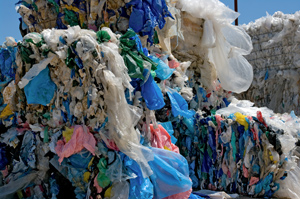PLASTICS RECYCLING
Malaysia closes its doors to flood of plastics waste / Third Southeast Asian country to stop imports
 Malaysia's suspension on plastics waste imports will not ease the stockpiling of low-quality waste (Photo: iStock/Huguette Roe) |
After Vietnam and Thailand (see Plasteurope.com of 13.07.2018), Malaysia is now taking action. In the last week of July, the Malaysian government said it will no longer accept plastics waste imports in the next three months. In addition, 114 companies will have licences revoked for plastics waste recycling for an initial period of three months. During this time, the companies are expected to upgrade their operations according to legal requirements, or else remain permanently closed.
Vietnam, Thailand and Malaysia were considered as nearby alternative destinations for the world's displaced recyclable waste, following China's decision to ban imports of plastics waste. Malaysia was one of the main recipients, especially for plastics waste originating from the UK. However, for environmental and organisational reasons, all three developing countries have chosen to close their doors to plastics waste. This should continue the feverish search for alternatives in Europe, which has already directed some flows to the poorer southeast of the continent.
In an article titled "The Chinese import ban and its impact on global plastic waste trade", scientists at the University of Georgia in the US have calculated the potential impact of the Chinese legislation. They estimate that with China's policy on waste imports, 111m t of plastics waste will be displaced by 2030.
Vietnam, Thailand and Malaysia were considered as nearby alternative destinations for the world's displaced recyclable waste, following China's decision to ban imports of plastics waste. Malaysia was one of the main recipients, especially for plastics waste originating from the UK. However, for environmental and organisational reasons, all three developing countries have chosen to close their doors to plastics waste. This should continue the feverish search for alternatives in Europe, which has already directed some flows to the poorer southeast of the continent.
In an article titled "The Chinese import ban and its impact on global plastic waste trade", scientists at the University of Georgia in the US have calculated the potential impact of the Chinese legislation. They estimate that with China's policy on waste imports, 111m t of plastics waste will be displaced by 2030.
03.08.2018 Plasteurope.com [240348-0]
Published on 03.08.2018

 German version of this article...
German version of this article...